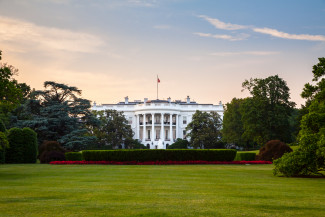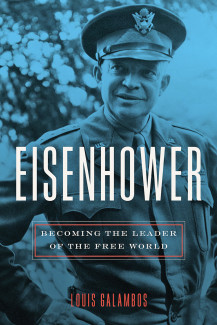
Johns Hopkins UniversityEst. 1876
America’s First Research University
Now Browsing:
Eisenhower: Becoming the Leader of the Free World

The pandemic has wiped out our social lives and the approaching election is dominating our political awareness. Dire straits for some of us. But an opportune time to start thinking seriously about what you really, truly want our presidents to be and to do for you, for America, and for the world. With that in mind, the Johns Hopkins University Press has released a paperback version of Eisenhower: Becoming the Leader of the Free World. This is a short (218 pages of text) study of Ike’s development and careers as a military and political leader. Although he led in both war and peace, this is not like the famous book with that title, a massive tome that has produced more guilt than entertainment for generations of beach-bound Americans. You can finish Eisenhower in a couple of evenings and find yourself better positioned intellectually to make your vital decisions in early November.
What you will see in action is a President who started his political career by deciding what the most important problems facing the nation were in 1953 and what the nation’s long-term goals should be. This was not as easy as it sounds. Why? Because every day, America’s 160 million people produced new and frequently complex problems. So did the more than one hundred sovereign nations in the world. Many of those problems seemed to call for some kind of immediate response by the President. The short-term tugged relentlessly on Ike’s attention.
Some of the tugging came from his own Republican Party, which was, like the Democratic Party, a broad national coalition. On the right-wing, Eisenhower had to contend with Senator Joseph McCarthy, who was spewing hate and fear and threatening to undermine the Administration’s carefully reasoned approach to foreign and domestic policy. Taking the advice of his brother Milton, Ike refused to legitimate the Senator by entering a shouting match with him. Instead, the President worked quietly behind the headlines to undermine McCarthy—and succeeded.
Meanwhile, Ike established an American foreign policy that would guide the nation through the Cold War with Communism and into the twenty-first century. He was fearful throughout of a reprise of Pearl Harbor, a surprise nuclear attack. Ike knew if there was a World War III, the destruction would be so horrible that nothing else would matter. He sought, successfully, to maintain the peace by staying well-armed for war.

His second and closely linked goal was to keep the American economy humming and the American people, women as well as men, working. By following The Middle Way, he said, we could achieve the nation’s two most important goals: Peace and Prosperity.
Steering down the middle of the road, Ike compromised frequently, developed new policies relentlessly, and failed occasionally. He was stunned when Britain, France, and Israel invaded Egypt (Suez in 1956) without discussing their plans with the White House. He held the western alliance together – barely. At Little Rock, he responded decisively to a challenge to federal authority, but found it impossible to implement a policy that would protect African-Americans’ rights while fostering incremental changes that would enable white southerners to adjust to this new social setting. So too with his efforts to rebuild the Republican Party from the bottom up; his goal was laudable but he failed to enlist a new cadre of vigorous, young leaders who would march forward behind the banner of The Middle Way.
Ike’s approach to presidential leadership involved much more compromising than his ultra-conservative older brother Ed demanded. Instead of cutting into Social Security as Ed advocated, Ike expanded the policy. He launched a massive, national road-building plan that could have fitted comfortably in a New Deal program blessed by FDR. Meanwhile, he worked with Lyndon Baines Johnson to push through Congress the nation’s first civil rights legislation since the end of Reconstruction.
If you find all of this presidential history boring because you are already suffering political overload, then you can just enjoy following Ike from Abilene to NATO in the pages of Eisenhower (Johns Hopkins University Press). Along the way, you will probably figure out how a small-town boy who loved football and girls more than homework actually became The Leader of the Free World.
Order Eisenhower: Becoming the Leader of the Free World – published in paperback on August 4, 2020 – at the following link: https://jhupbooks.press.jhu.edu/title/eisenhower
Louis Galambos is a research professor of history at Johns Hopkins University and an editor of The Papers of Dwight David Eisenhower. He is the author of Eisenhower: Becoming the Leader of the Free World.

What you will see in action is a President who started his political career by deciding what the most important problems facing the nation were in 1953 and what the nation’s long-term goals should be. This was not as easy as it sounds. Why? Because every day, America’s 160 million people produced new and frequently complex problems. So did the more than one hundred sovereign nations in the world. Many of those problems seemed to call for some kind of immediate response by the President. The short-term tugged relentlessly on Ike’s attention.
Some of the tugging came from his own Republican Party, which was, like the Democratic Party, a broad national coalition. On the right-wing, Eisenhower had to contend with Senator Joseph McCarthy, who was spewing hate and fear and threatening to undermine the Administration’s carefully reasoned approach to foreign and domestic policy. Taking the advice of his brother Milton, Ike refused to legitimate the Senator by entering a shouting match with him. Instead, the President worked quietly behind the headlines to undermine McCarthy—and succeeded.
Meanwhile, Ike established an American foreign policy that would guide the nation through the Cold War with Communism and into the twenty-first century. He was fearful throughout of a reprise of Pearl Harbor, a surprise nuclear attack. Ike knew if there was a World War III, the destruction would be so horrible that nothing else would matter. He sought, successfully, to maintain the peace by staying well-armed for war.

His second and closely linked goal was to keep the American economy humming and the American people, women as well as men, working. By following The Middle Way, he said, we could achieve the nation’s two most important goals: Peace and Prosperity.
Steering down the middle of the road, Ike compromised frequently, developed new policies relentlessly, and failed occasionally. He was stunned when Britain, France, and Israel invaded Egypt (Suez in 1956) without discussing their plans with the White House. He held the western alliance together – barely. At Little Rock, he responded decisively to a challenge to federal authority, but found it impossible to implement a policy that would protect African-Americans’ rights while fostering incremental changes that would enable white southerners to adjust to this new social setting. So too with his efforts to rebuild the Republican Party from the bottom up; his goal was laudable but he failed to enlist a new cadre of vigorous, young leaders who would march forward behind the banner of The Middle Way.
Ike’s approach to presidential leadership involved much more compromising than his ultra-conservative older brother Ed demanded. Instead of cutting into Social Security as Ed advocated, Ike expanded the policy. He launched a massive, national road-building plan that could have fitted comfortably in a New Deal program blessed by FDR. Meanwhile, he worked with Lyndon Baines Johnson to push through Congress the nation’s first civil rights legislation since the end of Reconstruction.
If you find all of this presidential history boring because you are already suffering political overload, then you can just enjoy following Ike from Abilene to NATO in the pages of Eisenhower (Johns Hopkins University Press). Along the way, you will probably figure out how a small-town boy who loved football and girls more than homework actually became The Leader of the Free World.
Order Eisenhower: Becoming the Leader of the Free World – published in paperback on August 4, 2020 – at the following link: https://jhupbooks.press.jhu.edu/title/eisenhower
Louis Galambos is a research professor of history at Johns Hopkins University and an editor of The Papers of Dwight David Eisenhower. He is the author of Eisenhower: Becoming the Leader of the Free World.

Login to View & Leave Comments
Login to View & Leave Comments


